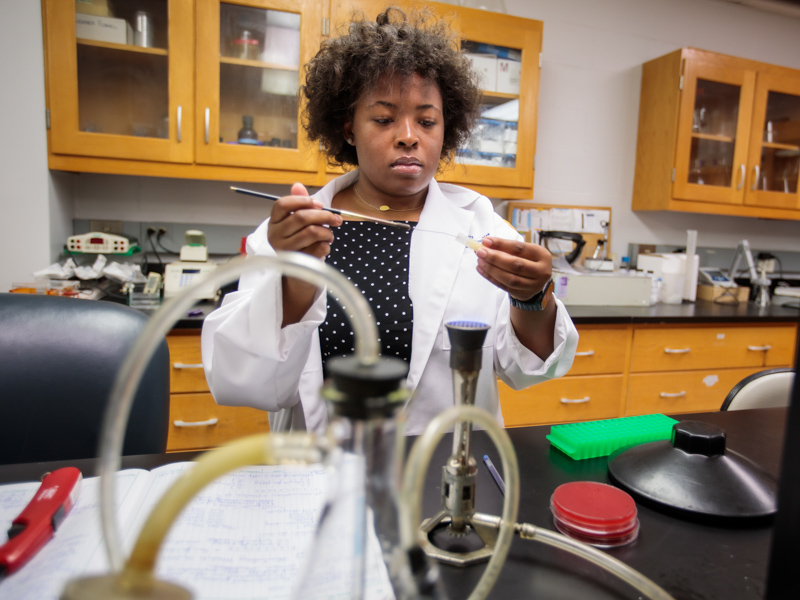Front and Center: Mary Carr

Editor's Note: In honor of Black History Month’s 2022 theme, Black Health and Wellness, we want to celebrate the contributions, breakthroughs and cultural richness of Black professionals and students at UMMC. See more Front and Center features.
When Mary Carr was considering graduate school options, she decided academic independence was a top priority.
During interviews, “I told faculty that I wanted to be able to develop my own research projects,” Carr said.
The University of Mississippi Medical Center offered Carr that freedom. Now, the Mississippi University for Women alumna is a third-year PhD student in microbiology and immunology in the School of Graduate Studies in the Health Sciences.
As part of her dissertation, Carr is studying IgA1 proteases, bacterial enzymes that cleave antibodies to limit the host’s defenses.
“I kept seeing this protease’s name in the literature, but there wasn’t much research on it,” she said. “I only found about 57 papers published since the 1970’s and I wondered, ‘why isn’t anybody studying it?’”
The National Science Foundation thought it was a good question as well. Carr applied for and received a Graduate Research Fellowship, the foundation’s flagship program for funding early-stage predoctoral research in the basic sciences. The five-year fellowship encompasses three years of financial support, including an annual stipend and a cost of education allowance to UMMC.
She is working on the first part of her project NSF-funded project, testing human IgA1 against the proteases from Streptococcus bacteria. These can cause sinus and ear infections, pneumonia and other conditions.
“Human IgA1 is important to mucosal immunity and S. pneumoniae colonizes mucosal surfaces, so studying the interaction between IgA1 and IgA1 protease could lead to important insights into the interaction between the human immune system and S. pneumoniae,” Carr said.
Most of her research will use in vitro models to understand the functions of IgA1. Later into her PhD work, she hopes to test her questions in the models used by her mentor, Dr. Mary Marquart in the Department of Microbiology and Immunology.
Carr has also been able to work on other projects. In October 2021, she was a co-author on a scientific publication looking at the genome of Viridans streptococci, bacteria that normally live in the mouth and throat but can cause eye infections.
After graduation, Carr plans to work as a postdoctoral fellow and eventually run a laboratory “that studies molecules produced by pathogenic bacteria that allow the bacteria to circumvent the human immune system and cause disease,” she said.
Outside of the lab, Carr stays active by playing UMMC intramural sports. She played indoor soccer with a team of first-year medical students and hopes to play in an outdoor league as well.
Since 2019, Carr has volunteered as an assistant troop leader with the Girl Scouts.
“My favorite part is how excited the girls get when it comes to science lessons,” she said. “Several months ago I taught the girls about bacteria and how important handwashing is, and I enjoyed teaching them just as much as they enjoyed learning.”


